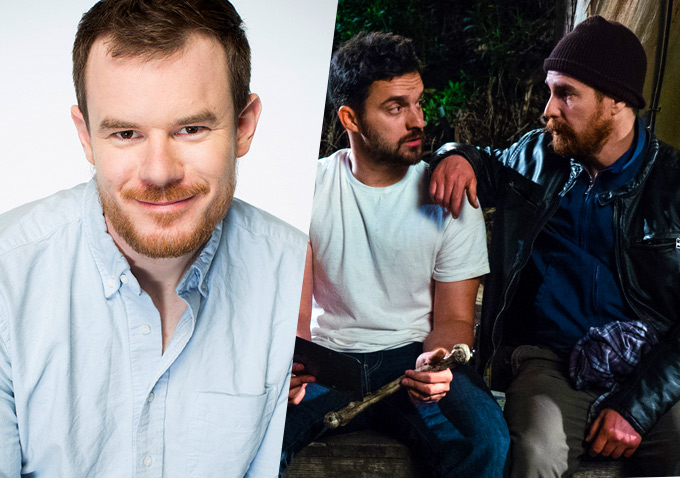 Joe Swanberg’s work has been consistently marked by an unflinchingly honest treatment of all things intimate: love, relationships, marriage, aging. Instead of glossing over rough spots, Swanberg dives into those moments and explores all of the emotions that create them, whether it’s hurt, anger, insecurity, lust, or jealousy. It’s unsurprising then, that the man himself is incredibly open and honest in conversation about his work. With his new film “Digging For Fire,” hitting theaters (read our review here), we had the opportunity to chat about a wide range of subjects, from his filmmaking inspirations to the thematic underpinnings of this newest work. As a personal filmmaker married to a personal filmmaker, Swanberg is clearly used to examining the difficulties of interpersonal relationships, and he demonstrates immense willingness to lay bare his thought process.
Joe Swanberg’s work has been consistently marked by an unflinchingly honest treatment of all things intimate: love, relationships, marriage, aging. Instead of glossing over rough spots, Swanberg dives into those moments and explores all of the emotions that create them, whether it’s hurt, anger, insecurity, lust, or jealousy. It’s unsurprising then, that the man himself is incredibly open and honest in conversation about his work. With his new film “Digging For Fire,” hitting theaters (read our review here), we had the opportunity to chat about a wide range of subjects, from his filmmaking inspirations to the thematic underpinnings of this newest work. As a personal filmmaker married to a personal filmmaker, Swanberg is clearly used to examining the difficulties of interpersonal relationships, and he demonstrates immense willingness to lay bare his thought process.
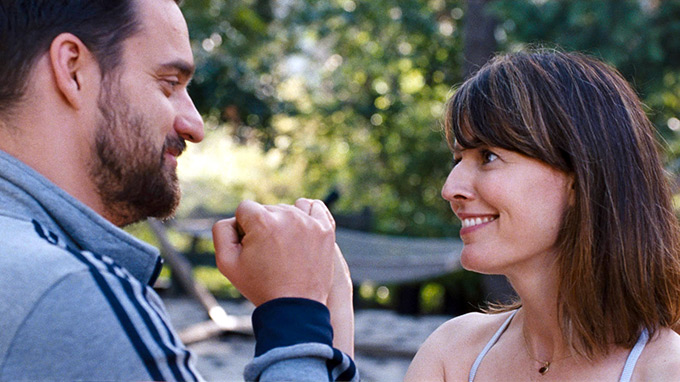 What was the process of co-writing the film with Jake [Johnson]?
What was the process of co-writing the film with Jake [Johnson]?
We had worked together on “Drinking Buddies,” and Jake was really a co-writer on that one too, in a lot of ways, the way the actors on my movies are always co-writers on my movie. We had had a really good time collaborating on that, and spent some time kicking around ideas and wanting to try and make another movie together. One night he texted me and he’s like, “Hey man, did I ever you tell you the story about that time I found that bone and gun in my yard?” We started talking about this real thing that had happened to him at one of his old apartments, and how he and his friends had gotten excited by the idea of digging around and trying to discover that. It almost immediately took on this very symbolic idea in my head, in terms of a father who is married with a kid and doesn’t feel like he’s the same cool, rebellious, crazy guy he used to be. He’s become really middle class and status quo. This group of men digging for this body was a fun way to talk about this identity crisis of being a parent and a husband, what that means.
Because I’m always wanting to balance that out in terms of relationships, we have to tell the wife’s side of that story too. There’s just a lot going on on the other end, so the movie split into these two parts—this husband and wife who are not talking to each other about it, but both feeling relationship malaise and suffering through these identity questions of “Who am I now? Have we become this couple that we didn’t mean to become? Are we still two individuals with our own shit going on?” Only they’re not asking that to each other, they’re quietly struggling with this, which I feel like has happened to my wife and I at certain points, and which I witness happening to friends of mine, where they’re talking to everybody else about it except their partner. I was interested in splitting this husband and wife up and having them deal with this separately and trying to figure this stuff out.
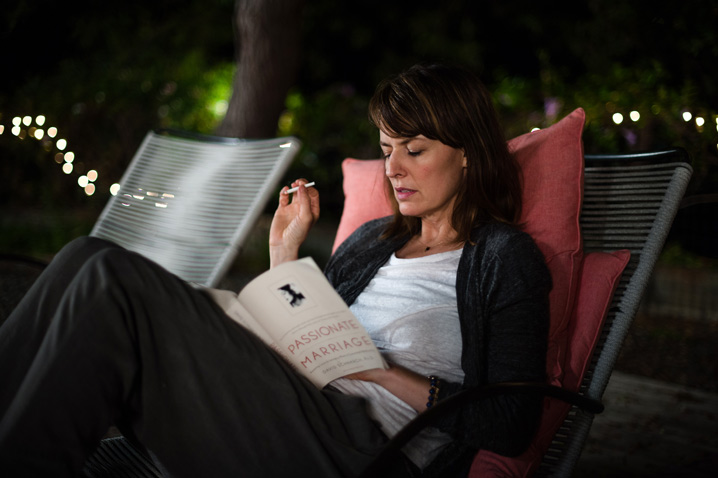 I saw your wife’s [Kris Swanberg] film “Unexpected,” and I think that movie’s also very honest about marriage and relationships, both of your work is very open about the complications of relationships. Is it interesting for you to see her take on things?
I saw your wife’s [Kris Swanberg] film “Unexpected,” and I think that movie’s also very honest about marriage and relationships, both of your work is very open about the complications of relationships. Is it interesting for you to see her take on things?
Definitely, her last film “Empire Builder,” was very much about that. It’s an ongoing conversation in our relationship. We are just like everybody else, we forget to check in with each other sometimes, get bothered by something and deal with it quietly. It’s definitely always fun to see that stuff come out in the work because it’s a really interesting, unfiltered take on it. In an ideal situation I’m learning as much from her movies as any other audience member is, even though I’m so close to the production, and so aware of what the movie’s about. The first time I watched “Unexpected” I was like, “oh cool so this is what it is,” this is how it’s coming out of you in an artistic way. I think it’s the same with “Digging For Fire.” It was interesting that we were working on these movies at the same time, while I was shooting “Digging For Fire,” she was casting “Unexpected,” and I suspect that creative overlap will happen for the rest of our lives. In general, we’re on this mission together, and because we’re both personal filmmakers, it can’t help but reflect itself in the work.
Do you find that there are any hazards from drawing so closely from your personal life and experiences to create your work?
I’m always asking the actors to contribute as much of themselves as they’re willing. I’ve certainly gotten better about talking to the actors about what I’m hoping to get, and how their own lives might help enrich that story, and also providing everybody with the safety net of playing characters. Giving people characters to hide behind, which in general allows a greater level of honesty than if you were playing yourself. Everybody contributing their stories into the pot and then swirling the pot around, and then assigning them to different people. Everything in my movies is true but it might not be true for the person who’s saying it. Jake is telling that guy’s story and that guy’s telling Jake’s story, and then they both get to be super honest and neither feels exposed in the wrong kinds of ways.
Honesty, for me, is always the best policy. I’m not afraid of the truth, so I’m not trying to run in the other direction of that stuff. I’m happy to deal with the ugly reality of life, and of my own life. Mine is the only life that I can talk of with total authority, and so I take the same approach with films. If she [Kris] wants to make a movie where she wants to portray the husband in a really bad light, I’m interested in that, I want her to have freedom to do that because if that’s how she feels, I’m excited to know it. That’s her art. That’s the place where she should feel the most free to be totally, brutally honest. That’s the space I feel like we’re trying to give each other in the relationship.
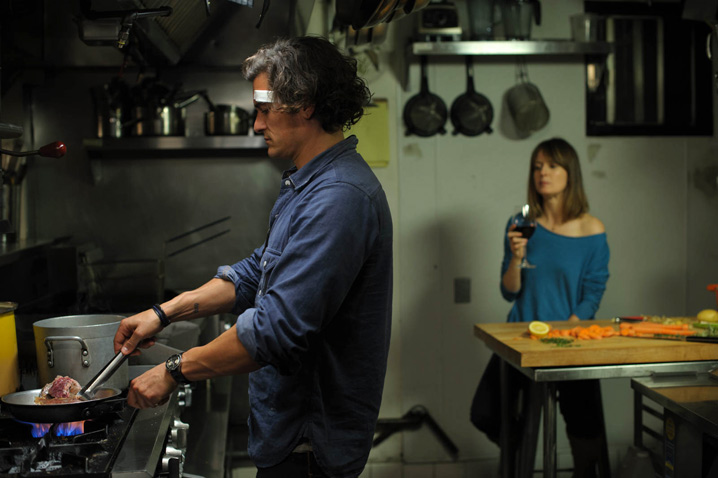 I noticed the film was dedicated in memory of Paul Mazursky, was his work an influence on this film?
I noticed the film was dedicated in memory of Paul Mazursky, was his work an influence on this film?
Paul Mazursky‘s huge for me, he’s definitely one of my heroes. His first couple of movies, especially, they inform all of my work these days, but “Bob and Carol and Ted and Alice” is my favorite movie. Mazursky spent his career documenting the lives of wealthy Beverly Hills couples, and I was interested in talking about money in this movie, and talking about class and this proximity to the rich and famous. Jake and Rosemarie’s characters are staying in the house of some movie star who she teaches yoga to. As somebody who lives in Chicago but spends a lot of time in LA, there’s this feeling of being constantly an outsider, and I think that’s probably true even of really famous movie stars who are suffering from Imposter Syndrome. For me there’s this feeling of Los Angeles and this feeling of wealth—as somebody who doesn’t have money, and didn’t grow up with money, I’m getting used to being around it, but it’s never my money.
It’s been an interesting aspect of the job, being a filmmaker, from almost the very beginning, when my friends and I were making $10,000 movies. It was this experience of not knowing how you’re going to pay your rent or buy groceries that month, but also being flown to some foreign country and put up in a five star hotel and showing your movie to 500 people, feeling like a king for a couple days and then coming back home to the reality of being totally broke. That is a thing that I’ve never quite known how to talk about. In “Digging For Fire,” I think we hit upon an interesting way to start to discuss that, with this middle class couple who gets to stay in this really fancy, nice house and what that does to them, how that starts to fuck with them because they’re like “oh man, some people have it a lot better than us!” That’s the danger of that proximity to wealth, you start to get a taste of the good life and then you go back to your life. Rosemarie’s character grew up around money and then she married this gym teacher, who’s strictly this public school working class, middle class guy and Jake’s character is taking that personally—“why’d you sign up for this life?” There’s a big contributing factor that Paul Mazursky’s work was always prodding at—feeling a class consciousness, being around money and how that messes with people.
Are there any other films about marriages and relationships that have an influence on this film?
My favorite relationship that I’ve seen in a movie or TV show is in “Friday Night Lights,” Coach Taylor and Tammy Taylor. That show consistently walked the fine line of a very realistic marriage and two people who had different goals and different passions, but were able to accommodate each other and create space for those things. That’s a big one for me. I’m always hoping to get it as right as that show got it.
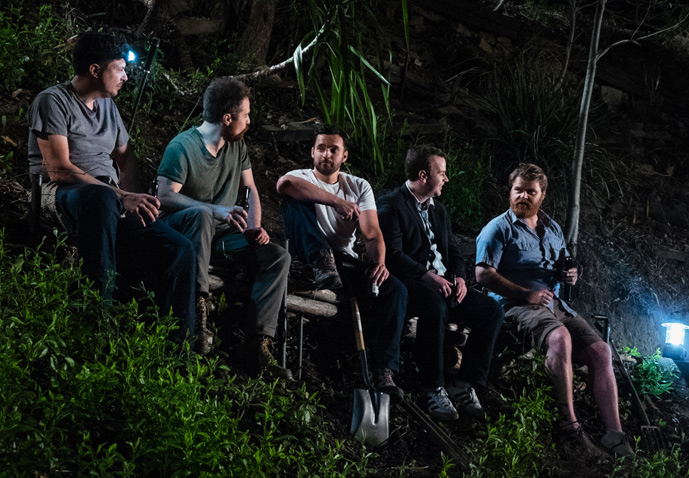 You often work with the same people, and this film has a lot of new faces, more of an ensemble, with some fun cameos. Are there other people you want to work with? How are you expanding your acting troupe?
You often work with the same people, and this film has a lot of new faces, more of an ensemble, with some fun cameos. Are there other people you want to work with? How are you expanding your acting troupe?
My feelers are always out. I make these things in a really collaborative way, so I’m always looking for people who are down to work like that, and excited by being writers in that way. Coming out of “Digging For Fire,” I definitely want to work with Mike Birbiglia again in a bigger way. I really want to work with Jenny Slate and Tim Simons again in a bigger way—a lot of people who I only had a day or two with. Orlando [Bloom] and I have stayed in touch. I think that guy’s a really good actor, I had a super fun time working with him. He’s somebody who I’m talking to about trying to find something. That’s typical of that way that I work and the way that I write. The chance to collaborate leads to and spawns other possibilities. Jenny’s only in this movie for a second, but I think she’s amazing, and it was chance to spend a couple hours working together, so we can feel it out. You can see how I direct, and I can see how you act, and see if that’s a fit. I think she’s great and I want to make a movie that she stars in, but I don’t know when that can happen because there’s a hundred actors that I want to work with in that way. I’m just seeing what lines up.
It’s interesting because I used to just be working with my buddies, saying, let’s make a movie tonight. These days, with somebody like Anna [Kendrick], who I hope to make 50 more movies with, I don’t know when she can fit me in again. Her career is in a really different place right now. If she ever wants to work with me again, it might not be for another ten years before she’s like, oh hey Joe, I’ve got some time off, let’s go do a little movie. There’s a lot of that going on with most of this cast. Everybody in “Digging For Fire” is so busy and becoming massive movie stars, so maybe I’ll just be waiting for the phone to ring.
I was doing some research and noticed an article on Criticwire that posited the suggestion that you may have been an inspiration for the Noah Baumbach film “While We’re Young.” Someone asked him about it and he said no, but I was wondering if you had a take on that.
I have no idea. You would have to take Noah at his word. I don’t know why he would lie about that. But, my wife did run an ice cream company, I did play in a band with a woman named Tipper, there’s a lot of really bizarre… Brady Corbet’s character in the movie is named Kent, who’s a buddy of mine who I’ve made a lot of movies with. So, you know, who knows? But, I really love that movie. I thought it was great, and if it’s about Kris and I, or sort of even loosely in that world, it felt really generous and interesting to me. It’s exactly the movie I would make, where you’re taking all these life experiences and swirling them around and trying to digest what’s going on. Having collaborated heavily with Noah for a year, the year of 2008, where we worked together on a lot of stuff, and then not really seeing him since then, it was cool to go see that movie and just get back into where that guy’s headspace might be at, what’s going on with him. And I thought the movie was really sharp, and funny, and interesting. I have no idea, if he says it’s not, it’s probably not.

